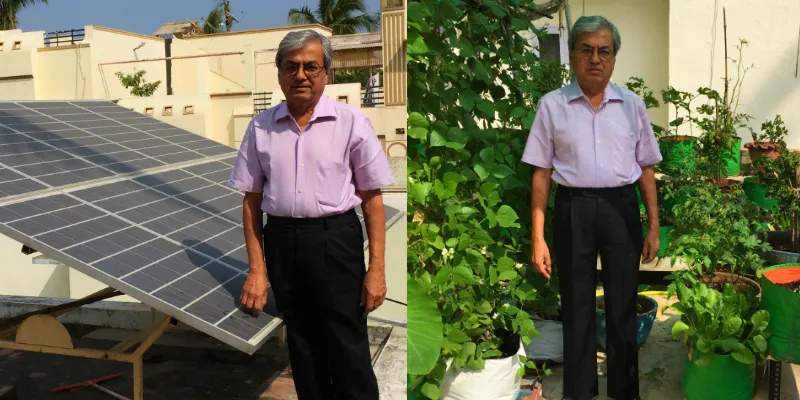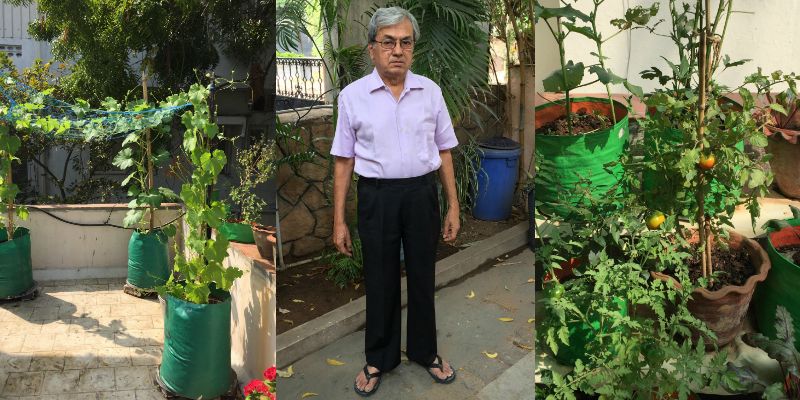How 71-year-old Solar Suresh built a mind-boggling house that satisfies all his needs, from air and water to food and gas
“Do not expect the government to find all the solutions. Help the government by finding solutions,” says a revolution disguised as a man.
And 'Solar Suresh', a term of endearment and wonderment he has gained, walks the talk too – as he sips some coffee brewed on a stove powered by his own biogas plant, while delightfully taking in the aroma of a curry cooked with the tomatoes and chillies grown in his own backyard. He switches off the fan powered by his rooftop solar plant to let in the breeze emanated by his “concrete jungle” flanked by an army of gallant bamboos and creepers.

More about this one-man army
D Suresh, the 71-year-old who leads a completely eco-friendly, self-sufficient and self-sustaining life by generating all the electricity and resources he needs to survive, lives at New 17 Vasu Street in Chennai’s Kilpauk with his wife, son and daughter-in-law, all of whom support and encourage his endeavours. In a career spanning 45 years, which he retired from in 2015, the IIT-Madras and IIM-A graduate has worked in textile marketing in various capacities including MD and CEO, taken his entrepreneurial plunge to found SAKS Ancillaries Ltd., and even spearheaded another entrepreneurial venture in the last-mile connectivity space.
Going yellow!
While it is difficult for him to determine exactly when he got the idea to build a “self-sufficient home”, he says that the seed was planted during his travels to Germany back in his manufacturing days about 20 years ago. “I witnessed many rooftop solar plants in Germany during my visits. And if a country with a lot less sunshine can install them, why not in India, which has solar energy in abundance?” he recounts. That catapulted him into prodding further and finding a vendor to install a rooftop solar plant for generating electricity.
One of the major hitches he faced was in finding a suitable rooftop solar plant vendor, and in getting a proper solar inverter. “The bigger names like Tata BP Solar, Su Kam and others did not show any interest or encouragement. But I managed to locate a local vendor with a wealth of knowledge and sharing my enthusiasm. I toiled hard for over a year to manufacture and design the solar power plant for my home,” he narrates.
By January 2012, Suresh had installed his 1 kw plant and officially started generating rooftop solar electricity. The installation simply requires a shadow-free area, about 80sqft per kw, and preferably on a rooftop. No separate wiring is required within the home.
Specialists and senior government officials like the chairman of Tamil Nadu Energy Development Authority came down for a visit to see his installation in action. By April 2015, he had scaled it up to 3kw - and it now powers 11 fans, 25 lights, a refrigerator, two computers, a water pump, two televisions, a mixer-grinder, a washing machine and an inverter AC.
Today, setting up the plant takes just one day. Maintenance entails quarterly cleaning of the panels. “This plant generates electricity even during mild rainy days - since it depends on the UV rays falling on the panel and not the intensity of heat or light. On extremely heavy rainy days - though rare in Chennai - the load is supplied by batteries, which are charged by solar and not by grid,” Suresh explains.
Suresh says he hasn’t experienced a power-cut even for a minute in the last four years despite living in the city notorious for its power problems. He also saves electricity charges by producing around 12-16 units a day. “It is a sustainable, affordable, viable project, presently giving over six percent tax-free return including battery replacement,” he explains.

His domestic biogas plant
Riding on the success of his solar plant, Suresh decided to address his external gas needs next, by installing a domestic biogas plant of 1-cubic metre capacity, to process around 10kg organic waste per day, and produce about 20kg of gas per month.
He also busted the myth by proving that no odour is generated. The plant eats organic waste such as cooked and uncooked food, spoilt food, vegetable and fruit peels etc – the only thing to be mindful of was not feeding citric items such as lime, orange, and onion, egg shells, bones or ordinary leaves into it.
Two useful resources are generated - cooking gas and organic manure. In fact, he has even identified some vegetable vendors in his locality who otherwise have to spend money to dispose of their waste, but now happily drop it off daily at his biogas plant.
Here is the best part - biogas is a non-compressed gas, and therefore carries no risk of explosion or gas leaks, even if the gas knob is left open. It is also non-polluting and saves foreign exchange for the country by reducing dependency on fossil fuels.
Rainwater harvesting
Suresh installed his rainwater harvesting apparatus over 20 years ago. He explains that this too does not require daily maintenance and only that the terrace space and the apparatus needs to be cleaned before the monsoon season commences.

Concrete jungle and kitchen garden
He has also created a forest-like vibe around his house with a thick bamboo plant-fence and creepers that entwine around over them creating a barrier. “When on the terrace, one gets a feeling of being in a forest and not part of the hustle and bustle of a city. One can’t see any neighbouring buildings and the chaotic traffic – only greenery,” he states.
Suresh's home forest is a topic of great admiration. As a novice with limited knowledge, he started this kitchen garden with okra and tomato. Today, he organically grows about 15-20 types of vegetables. Most of thehousehold cooking needs are now taken care of by their kitchen garden.
Spreading the goodness!
Suresh says that he is saving a good amount of money through his rooftop solar plant. Before that, his annual electric consumption was 8,100 units, but, upon installing a 1 kw plant, his consumption went down to 5,550 units, and by 2016, after installing his 3kw plant, it has condensed to 3,450 units. He is also protected from fluctuations in tariffs.
A one-man army
Suresh has pledged to take this revolution to as many households, organisations and institutions as possible through education and persuasion, on a pro-bono basis. So far, he has helped install solar power plants in three offices, four schools and seven households across Bengaluru, Hyderabad, and Chennai, and biogas plant in six institutions in Chennai and Hyderabad, and kitchen gardens in six places in Chennai.
He has also been invited by institutions in Chennai to throw light on the benefits of his initiatives. New 17 Vasu Street has become a popular destination for study tours for school students from and over 500 people have visited his house to see installations in action. Next up, Suresh will be associated with two projects – producing drinking water from atmospheric air using solar power, and developing a digital key for two-wheelers, where the vehicle can be started only on keying in a unique four-digit password.











